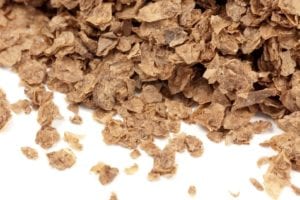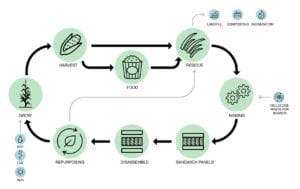 Organic waste could be the answer to tackling the global problem of rising levels of waste and depleted resources, according to multinational professional services firm Arup.
Organic waste could be the answer to tackling the global problem of rising levels of waste and depleted resources, according to multinational professional services firm Arup.
Globally the construction industry is one of the largest users of raw materials.
Capturing organic waste streams from cities and the countryside could provide the industry with lower-cost, lower-CO2 building materials such as bricks, insulation and partition boards.
The latest report by the firm envisages a completely circular system with building waste fed back into the biological cycle at the end of its service life with nutrients returned to the soil.
The report points to advances in the development of alternative organic materials, including mushroom bricks grown in five days and waste potatoes used as insulation and acoustic absorbers.
Arup has created the SolarLeaf, the first façade system in the world cultivating micro-algae to generate heat and biomass and BioBuild, the first self-supporting façade panel made out of bio-composite materials.
 Moving away from the take, use, dispose mentality
Moving away from the take, use, dispose mentality
Innovative manufacturing processes are a significant enabler, with 3D printing of bio-polymers becoming increasingly widespread.
Guglielmo Carra, European Lead for Materials Consulting at Arup, said: “As one of the world’s largest users of resources we need to move away from our ‘take, use, dispose’ mentality. There are already pockets of activity, with some producers making lower-CO2 building products from organic materials.
“What we need now is for the industry to come together to scale up this activity so that it enters the mainstream. An important first step is to work with government to rethink construction codes and regulations to consider waste as a resource, opening up the opportunity to repurpose it on an industrial-scale.”
The report, The Urban Bio-Loop: Growing, Making and Regenerating is available to download.
 Organic waste could be the answer to tackling the global problem of rising levels of waste and depleted resources, according to multinational professional services firm Arup.
Organic waste could be the answer to tackling the global problem of rising levels of waste and depleted resources, according to multinational professional services firm Arup. Organic waste could be the answer to tackling the global problem of rising levels of waste and depleted resources, according to multinational professional services firm Arup.
Organic waste could be the answer to tackling the global problem of rising levels of waste and depleted resources, according to multinational professional services firm Arup. Moving away from the take, use, dispose mentality
Moving away from the take, use, dispose mentality